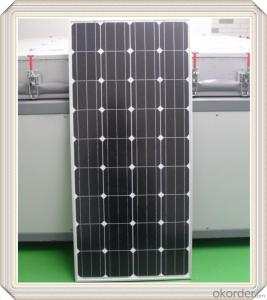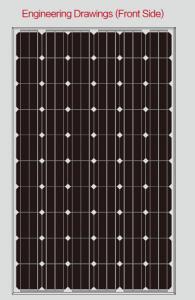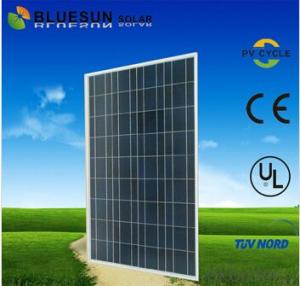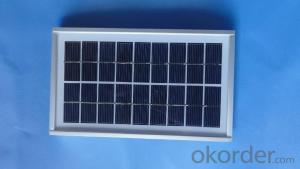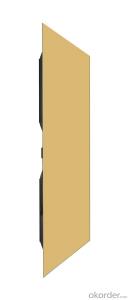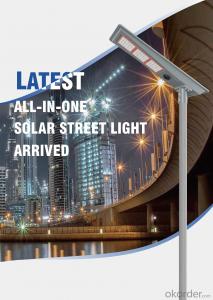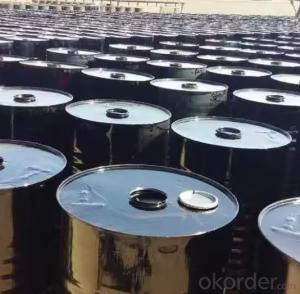270Watt CNBM Solar Monocrystalline Series (250W—270W)
- Loading Port:
- China main port
- Payment Terms:
- TT OR LC
- Min Order Qty:
- 100000 watt
- Supply Capability:
- 500000 watt/month
OKorder Service Pledge
OKorder Financial Service
You Might Also Like
Item specifice
CNBM Solar Monocrystalline Series III (250W—260W)


Characteristics
Max Power Voltage Vmp(V) | 30.1 | 30.2 | 30.4 | ||
Max Power Current Imp(A) | 8.32 | 8.44 | 8.55 | ||
Open Circuit Voltage Voc(V) | 37.5 | 37.6 | 37.7 | ||
Short Circuit Current Isc(A) | 8.87 | 8.99 | 9.10 | ||
Max Power Pm(W) | 250 | 255 | 260/265 | ||
Temperature Coefficient of Cells
NOCT | 45℃±2℃ | |
Temperature Coefficients of Isc (%/℃) | - 0.0492 | |
Temperature Coefficients of Voc (%/℃) | – 0.3374 | |
Temperature Coefficients of Pmp (%/℃) | –0.4677 | |
Mechanical Data
Dimension | 1638 x 982 x 40 mm | |
Weight | 19.5kg | |
No. of Cells and Connections | 60 (6 x 10) | |
Tolerance | 0~+5W | |
Cell Monocrystalline Cell | 156 x 156 mm | |
Packing | 700 Pcs/40ft(H) Container | |
Limits
Operating Temperature | –40 °C to +85°C | |
Storage Temperature | –40 °C to +85°C | |
Max System Voltage | 1000VDC(IEC) / 600VDC(UL) | |
IV Curve
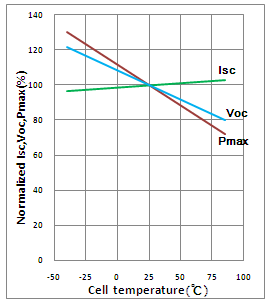
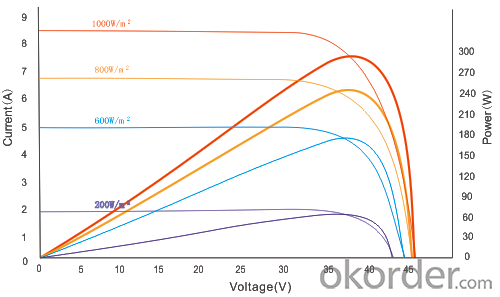
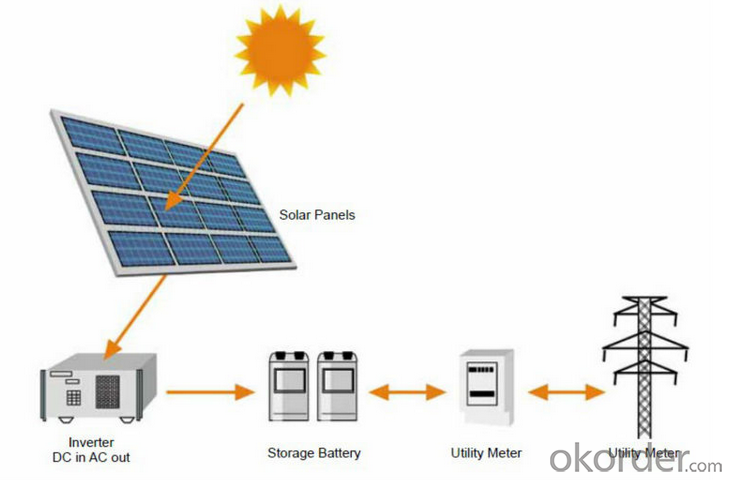
Image
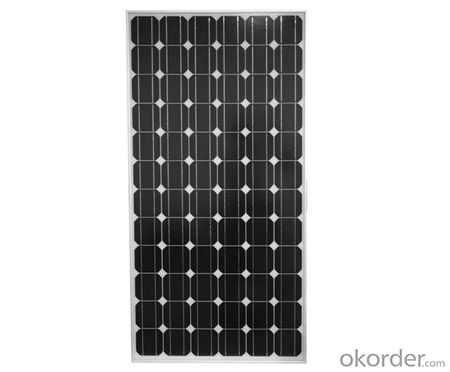
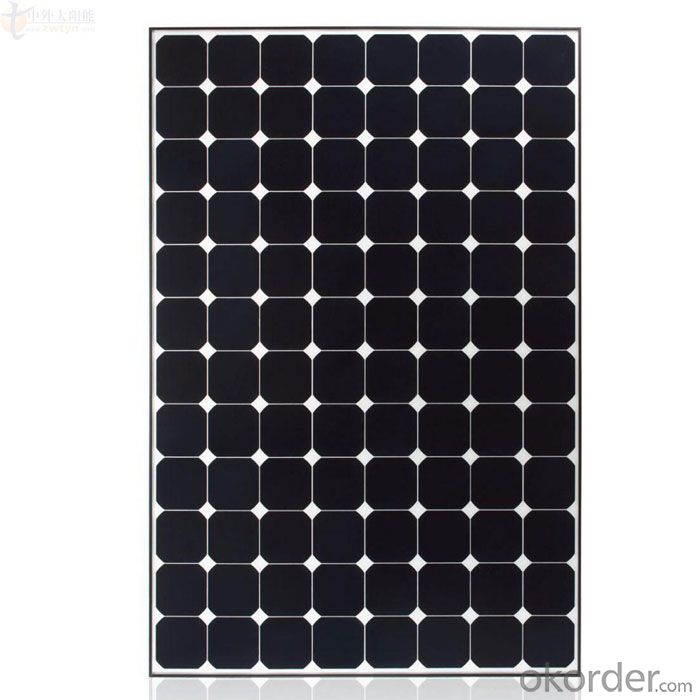
Guarantees
Products Guarantee 12 yrs free from defects in materials and workmanship
Performance Guarantee No less than 90% within 10yrs and no less than 80% within 25yrs
Certificates TUV (IEC61215&IEC61730), VDE(IEC61215&IEC61730), UL, CE
FAQ
1. Q: Do you have your own factory?
A: Yes, we have. Our factory located in Jiangsu province.
2. Q: How can I visit your factory?
A: Before you take off from your country, please let us know. We will show you the way, or arrange time to pick you up if possible.
3. Q: Do you provide free sample?
A: Usually we do not offer free sample
4. Q: Could you print our company LOGO on the nameplate and package?
A: Yes, we can do that.
- Q:Can solar panels be installed on a parking lot or carport?
- Yes, solar panels can be installed on a parking lot or carport. In fact, these locations are ideal for solar panel installations as they provide ample space and can generate clean energy while also providing shade and protection for vehicles. This dual-purpose approach helps maximize the benefits of solar energy and optimizes land usage.
- Q:I would like to connect a solar panel to a small fan. I am not sure as to what is needed to actually quot;connectthe two together. Any help is appreciated.
- Solar panel hooked to a battery or two then to a small inverter then to your 20 volt fan ....... Or .... Solar panel to 2 volt battery wired to a 2 volt fan. I use both
- Q:The voltage and power problems of solar panels
- From morning to night (with sunshine) solar panel voltage is generally relatively stable, that is basically about 30V; but the output power is always changing, sooner or later, noon; if it is good quality solar energy,
- Q:I want to build a Solar Panel at home.Where can I find possibilities for Selfmade Solar Panels
- Did okorder / . It might surely benefit anyone!
- Q:Solar panel packages have different levels of power. For instance you can get a kw system but is this kw per hour or day. How does this work?
- it would be an instantaneous rating at maximum output. To get the the amount of power produced, you would multiply the number of hours at near peak output. kw X 5 hours = 5kwh or about 50 cents of electricity.
- Q:My hubby and I are waiting to move in to our camper but have to figure out how many solar panels, batteries, etc. to get. I can't find the info per appliance for Watts and amps, but does anyone have a good, general idea of how many Watts it'd take to run the whole shabang? It's a 999, 25-foot Sportsmen tag-a-long, if that helps..It's got the following, and we'd like to run the propane things off of electric:*Refrigerator/freezer*Microwave*Oven/stove*AC/Heat*Will have a tv, phone chargers, laptop charger, but those will be unplugged when not in useThanks so much! It's such a headache.. You get SO MUCH different info from different places.. OI..
- With an RV, you can find lithium bromide water chiller based refrigerators and air conditioner that run mostly on propane with just a little bit of electricity for a pump and fans. The oven, stove and heat, you can also run off propane. A Microwave is probably 750 watts but only operates for a few minutes at a time. You'll just have to go through everything item by item and figure out how many watts each one will draw and how long each will run per day to size your solar panel. Don't forget that the sun will only shine for a few hours each day. In general, for a camper, the target isn't to produce all the power you need but to slow down the drain on the battery bank to last till you get back onto the road where the engine can recharge the batteries. Keep in mind that the lithium bromide chiller systems only operate when stationary and level so some people opt for conventional electric systems just for convenience which sounds like what you're trying to do. Best way to figure out how much power each is drawing is by measuring it while in use. It may be worth it to put a meter on the battery bank and go camping one weekend with a generator or put a meter on the main circuit breaker panel and camp where power is provided, just to see what your typical use is. You're far better off running as much as possible from propane.
- Q:Can solar panels be used in commercial buildings?
- Yes, solar panels can be used in commercial buildings. Many businesses and organizations are incorporating solar panels into their buildings to reduce energy costs, decrease their carbon footprint, and take advantage of potential tax incentives or subsidies. Commercial buildings have ample roof space to accommodate solar panels, and with advancements in technology, solar panels can be integrated seamlessly into the building's design.
- Q:Do solar panels require maintenance?
- Yes, solar panels do require some maintenance. Regular cleaning to remove dirt and debris is necessary to ensure optimal performance. Additionally, checking for any signs of damage, such as cracks or loose connections, is important. Routine inspections and occasional repairs or replacements may be needed to keep the solar panels functioning efficiently.
- Q:Hello, I have been trying to go green, I Have purchase somesolar panel they are about 45watts I been putting it against my window and getting ok power out of it enough for my lights and a couple of low watts gadget (cellphone, 2v light, portable dvd) for couple of hours.But its seem to drain the 2v faster then I can charge Am I getting the most power out of my panel?Or should I place it on the roof? I'm in Texas and it gets hot and sunny the sun beam my room windows pretty good during 4pm-6pm.
- The MOST efficient placement is on a motorized mounting that constantly moves it to face the Sun directly. Almost nobody does that because it is clumsy and expensive. The best fixed position is facing X degrees due south of straight up, where X is your latitude. I am in Austin, at about 30 degrees latitude, so on the south side of a 30 degree pitched roof would be ideal. The direct south facing it the best average to catch morning and afternoon sun, with most efficient pointing at noon. The tilt equal to latitude is the best average between the high Sun in summer and low Sun in winter, with most efficient pointing in spring and fall.
- Q:Can solar panels be used to power a farm?
- Yes, solar panels can be used to power a farm. By harnessing the power of the sun, solar panels can generate electricity that can be used to run various farm operations such as irrigation systems, grain dryers, electric fencing, and even power agricultural machinery. This renewable energy source not only reduces reliance on fossil fuels but also helps farmers save on energy costs while promoting sustainability.
1. Manufacturer Overview |
|
|---|---|
| Location | |
| Year Established | |
| Annual Output Value | |
| Main Markets | |
| Company Certifications | |
2. Manufacturer Certificates |
|
|---|---|
| a) Certification Name | |
| Range | |
| Reference | |
| Validity Period | |
3. Manufacturer Capability |
|
|---|---|
| a)Trade Capacity | |
| Nearest Port | |
| Export Percentage | |
| No.of Employees in Trade Department | |
| Language Spoken: | |
| b)Factory Information | |
| Factory Size: | |
| No. of Production Lines | |
| Contract Manufacturing | |
| Product Price Range | |
Send your message to us
270Watt CNBM Solar Monocrystalline Series (250W—270W)
- Loading Port:
- China main port
- Payment Terms:
- TT OR LC
- Min Order Qty:
- 100000 watt
- Supply Capability:
- 500000 watt/month
OKorder Service Pledge
OKorder Financial Service
Similar products
New products
Hot products
Related keywords
